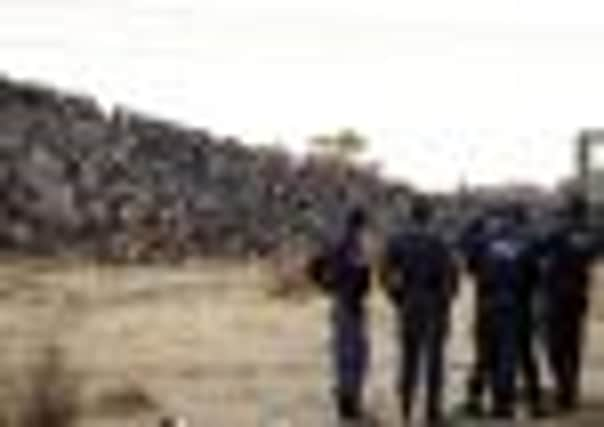Zuma orders Marikana massacre inquiry


The shootings at the Lonmin-owned Marikana mine, north-west of Johannesburg, came after ten people were killed during a week-old “wildcat” strike organised by the Association of Mineworkers and Construction Union, a radical organisation challenging the National Union of Mineworkers for members.
Among the ten dead were two police officers, reportedly battered to death by strikers, and two security guards who burned to death when their vehicle was set alight.
Advertisement
Hide AdAdvertisement
Hide AdEyewitness reports suggest the latest shootings took place after demonstrators wielding clubs and machetes rushed a police line. However, some video footage suggests police opened fire on protesters running from clouds of tear gas.
Zuma, leader of the ruling African National Congress, said: “I am convinced that the commission of inquiry will uncover the truth and facts will emerge. The inquiry will enable us to get to the real cause of the incident, and to derive the necessary lessons.”
Zuma said he was “shocked and dismayed at this senseless violence”.
He added: “We believe there is enough space in our democratic order for any dispute to be resolved through dialogue without any breaches of the law or violence.”
ANC spokesman Jackson Mthembu added: “The tragic violence needs to be thoroughly investigated to determine the cause and circumstances of all the deaths including those of police, security and the miners.
“We also call on the community and all unions not to allow themselves to be agitated and instigated by agent provocateurs who won’t give peace a chance.”
Angry relatives complained that police and mine management have failed to produce a proper register of the dead.
Wives of miners have also staged a protest, demanding to know why officers fired automatic rifles, pistols and shotguns at the strikers.
Advertisement
Hide AdAdvertisement
Hide AdPolice spokesman Captain Dennis Adriao said officers were using the mine’s database to contact the families of those killed, injured or arrested. “We are working with our detectives as well as mine management to identify all those that are deceased and injured, as well the contact details for families and so forth, and that is a process that is under way.”
Tensions remain high among strikers, who are demanding monthly salary rises from around £400 to £1,000.
Winch operator Makhosi Mbongane said: “They can beat us, kill us and kick and trample on us with their feet, do whatever they want to do, we aren’t going to go back to work. If they employ other people they won’t be able to work either. We will stay here and kill them.”
However, Simon Scott, the chief financial officer of the London-listed owners, Lonmin, said the strike at the mine was “illegal” and had got out of control.
He added: “We have had good relationships with our unions in the past. What’s happened over the last week has been a blow but it’s our intention to get those relationships back on to a good footing.”
Lonmin, the world’s third-largest platinum producer, has been involved in previous labour disputes at the Marikana mine.
In May 2011, it sacked some 9,000 employees after what it described at the time as “unprotected industrial action”. Lonmin and the NUM said all were later reinstated. The latest bout of unrest began on 10 August, as some 3,000 workers walked out over pay. Any who tried to go to work last Saturday were attacked by strikers.
On Sunday, the striking miners killed two security guards by setting their car ablaze, authorities said.
Advertisement
Hide AdAdvertisement
Hide AdBy Monday, angry mobs killed two other workers and overpowered police, killing two officers, officials said. Officers opened fire that day, killing three strikers, police said.
On Tuesday and Wednesday, thousands of miners were gathered at a rocky outcrop within sight of the mine’s smelter. They cheered, sang and marched around with machetes and clubs under the watchful eye of police in armoured trucks.
Some leaders of the miners spoke to the police and largely followed their instructions, breaking up the protest as dusk fell.
But it remains unclear what sparked the miners’ fatal charge at police on Thursday. While the initial walkout and protest focused on wages, the ensuing violence has been fuelled by the struggles between the dominant NUM and the upstart AMCU. Disputes between the two unions escalated into violence earlier this year at another mine.
Black miners have long endured low salaries and poor living conditions in shantytowns beset by alcoholism, drug abuse and prostitution.
Apartheid kept black African workers from more lucrative jobs offered to whites. Though the nation became truly democratic in the 1990s, the salaries of black miners remain low. Mining drives the economy of South Africa, which remains one of the world’s dominant producers of platinum, gold and chromium. Lonmin’s mine at Marikana produces 96 per cent of all its platinum.
South Africa faces myriad problems 18 years after white racist rule ended, including growing inequality between a white minority joined by a small black elite while most blacks endure high unemployment and inadequate housing, health care and education.
The shootings “awaken us to the reality of the time bomb that has stopped ticking – it has exploded,” The Sowetan newspaper said in a front-page editorial on Friday. “Africans are pitted against each other… They are fighting for a bigger slice of the mineral wealth of the country.”
Advertisement
Hide AdAdvertisement
Hide AdThousands of the miners have cheered on controversial youth leader Julius Malema, who called for Zuma to resign over the clashes. The expelled politician was welcomed as a hero yesterday by thousands of strikers.
Malema is the first politician to address them at the site and said he was offering support because the government had turned its back on them, and calls to nationalise foreign-owned mines.